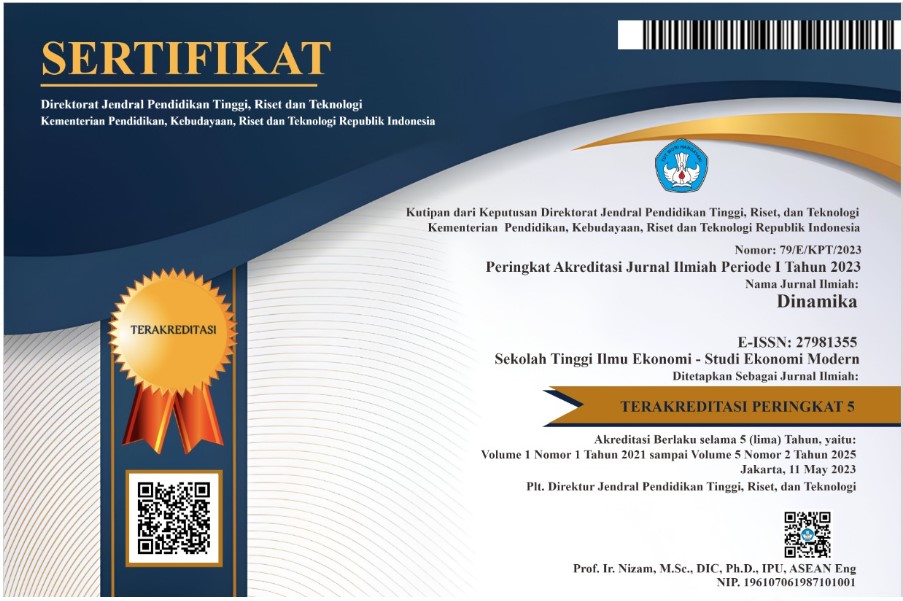ANALISIS DAMPAK INTEGRASI ESG PADA PROFIL RISIKO-RETURN PORTOFOLIO INVESTASI
DOI:
https://doi.org/10.51903/dinamika.v4i1.485Keywords:
ESG, portfolio return, portfolio risk, PT Unilever Indonesia Tbk, case studyAbstract
This research aims to analyze the impact of Environmental, Social, and Governance (ESG) integration on the risk-return profile of the investment portfolio of PT Unilever Indonesia Tbk. The research employs a quantitative method with a case study approach, utilizing historical data from the period 2017-2021. The data is analyzed to identify the relationship between ESG scores and portfolio returns, as well as portfolio risk. Regression analysis and t-test are employed to test the research hypotheses.
The findings reveal a positive and significant relationship between ESG integration and the investment portfolio's return of PT Unilever Indonesia Tbk. The regression coefficient of 0.154 indicates that each one-point increase in the ESG score will result in an average increase of 0.154% in the investment portfolio return.
References
[2] M. Orlitzky, F. L. Schmidt, dan S. L. Rynes, Corporate social and financial performance: A meta-analysis, vol. 24, no. 3. 2003. doi: 10.1177/0170840603024003910.
[3] H. Jo dan H. Na, “Does CSR Reduce Firm Risk? Evidence from Controversial Industry Sectors,” J. Bus. Ethics, vol. 110, no. 4, hal. 441–456, 2012, doi: 10.1007/s10551-012-1492-2.
[4] G. Friede, T. Busch, dan A. Bassen, “ESG and financial performance: aggregated evidence from more than 2000 empirical studies,” J. Sustain. Financ. Invest., vol. 5, no. 4, hal. 210–233, 2015, doi: 10.1080/20430795.2015.1118917.
[5] S. El Ghoul, O. Guedhami, C. C. Y. Kwok, dan D. R. Mishra, “Does corporate social responsibility affect the cost of capital?,” J. Bank. Financ., vol. 35, no. 9, hal. 2388–2406, 2011, doi: 10.1016/j.jbankfin.2011.02.007.
[6] W. Andayani, “Disclosure of Corporate Social Responsibility, Company Performance, and Corporate Reputation as the Mediating Role: Indonesian Context,” J. Account. Invest., vol. 22, no. 3, hal. 581–601, 2021, doi: 10.18196/jai.v22i3.12190.
[7] F. W. Aditama, “Analisis Pengaruh Environment, Social, Governance (Esg) Score Terhadap Return Saham Yang Terdaftar Di Index Idx30,” Contemp. Stud. Econ., vol. 1, no. 4, hal. 592–602, 2022.
[8] Y. YUANISA NURFAHMI dan I. Anis, “Pengaruh Sustainability Awareness Terhadap Kinerja Keuangan Dan Nilai Perusahaan Di Sektor Pertanian 2016-2020,” J. Ekon. Trisakti, vol. 2, no. 2, hal. 1953–1972, 2022, doi: 10.25105/jet.v2i2.14903.
[9] D. awaluddin, fariz rahmadan, “1241-Article Text-2699-1-10-20210712,” Peran Pengemb. Dan Pemanfaat. Teknol. Pendidik. Dan Pembelajaran Dalam Meningkat. Kualitas Mengajar, vol. 2, no. 2, hal. 1–12, 2021.
Downloads
Published
Issue
Section
License
Copyright (c) 2024 Dinamika: Jurnal Manajemen Sosial Ekonomi

This work is licensed under a Creative Commons Attribution-ShareAlike 4.0 International License.












